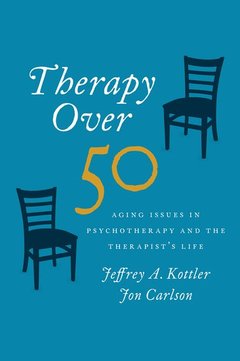Description
Therapy Over 50
Aging Issues in Psychotherapy and the Therapist's Life
Authors: Kottler Jeffrey, Carlson Jon
Language: English
Subject for Therapy Over 50:
Publication date: 07-2016
256 p. · 16.3x23.7 cm · Hardback
256 p. · 16.3x23.7 cm · Hardback
Description
/li>Biography
/li>
Traditional training in counseling and psychotherapy makes minimal distinctions on the ages of the client and therapist in the treatment process. Therapy Over 50: Aging Issues in Psychotherapy and the Therapist's Life highlights how therapy is frequently a very different process for the older client and therapist. Specifically, this book explores: a) how therapists over 50 (or approaching that life transition) experience, struggle, and enjoy doing therapy in ways that are different from when they were younger (this includes their special challenges, adaptations, fears, and joys); and b) the landscape related to working clinically with aging clients, and those approaches and strategies that work best with this population. The text also includes both current research and classic literature on the subject of aging issues in therapy, as well as current excerpts from interviews the authors will conduct with some of the most notable aging figures in the fields of counseling, social work, marriage and family therapy, and clinical psychology.
Jeffrey A. Kottler, PhD, is Professor of Counseling at California State University, Fullerton and President of Empower Nepali Girls, an organization that provides educational scholarships for at-risk children in Nepal. He has served as a Fulbright Scholar and Senior Lecturer in Peru (1980) and Iceland (2000), and worked as a Visiting Professor in New Zealand, Australia, Hong Kong, Singapore, and Nepal. Jon Carlson, PsyD, EdD, is Distinguished Professor of Psychology and Counseling at Governors State University, University Park, Illinois and a Psychologist with the Wellness Clinic in Lake Geneva, Wisconsin. He has received lifetime achievement awards from several professional associations, including the American Psychological Association and the American Counseling Association.
© 2024 LAVOISIER S.A.S.

